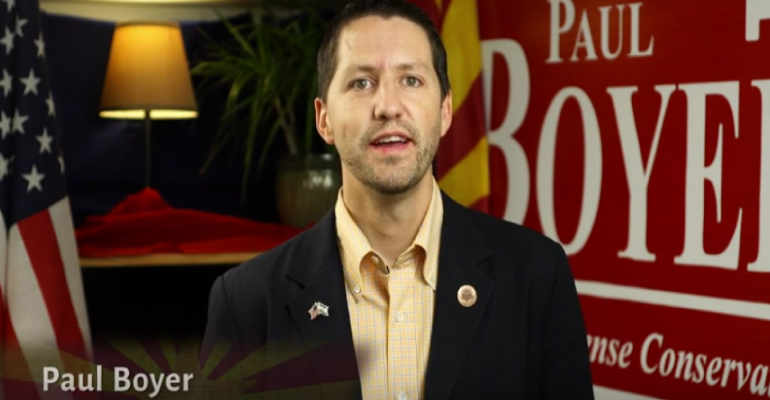
In a last ditch effort to undermine efforts to protect Arizona students’ personally identifiable information embodied in HB2088, Rep. Paul Boyer has introduced a striker bill, HB2293, to be heard by the Education Committee today. The move came as a surprise to parents who have worked over the past year developing legislation to ensure that they must provide informed consent for data gathering student exercises.
Education policy analysts have dubbed Boyer’s bill the “Student Testing/Software Company Protection Bill of 2016.”
Boyer, who is essentially a functionary for the corporate charter school industry and the chambers of commerce, has worked tirelessly to subvert parents’ authority over their childrens’ education, while protecting data gathering instruments.
While Boyer’s bill prevents entities from using the data collected to create targeted advertising, it does not prevent data from being used for adaptive learning.
In an article for Inside Higher Ed, Steve Kolowich wrote in 2013:
Arizona State University has become ground zero for data-driven teaching in higher education. The university has rolled out an ambitious effort to turn its classrooms into laboratories for technology-abetted “adaptive learning” — a method that purports to give instructors real-time intelligence on how well each of their students is getting each concept.
This is what happens when the dawning age of high-volume data collection and analysis collides with higher education: College professors become less like mind-molders and more like mind-readers. But it also stands to do more than that.
The so-called Big Data movement, which has been largely co-opted by the for-profit education industry, will serve as “a portal to fundamental change in how education research happens, how learning is measured, and the way various credentials are measured and integrated into hiring markets,” says Mitchell Stevens, an associate professor of education at Stanford University. “Who is at the table making decisions about these things,” he says, “is also up for grabs.”
There are a few different ways to try to wrap your head around the implications of the Big Data movement in higher education. You can think about how it changes the experience of teachers and students in the classroom. You can think about how it informs the strategic thinking in university administrative offices. You can think about how it binds nonprofit universities and for-profit product vendors in new legal relationships.
Arizona parents – by and large – do not want their children to be sources of information for industry. They want schools to be sources of information for children. Highly effective teachers practice adaptive learning every day. Few need a computer model to tell them if their students are learning the concepts they are teaching.
There concerns with Boyer’s bill are:
- It’s vague and too poorly written to actually protect student data/privacy so it just protects the companies’ ability to collect data and do research on kids in real time as much as they want.
- There is no transparency in what the companies can and will collect.
- There is no standard of data security for details about our children’s mental and intellectual state.
- There is no parental consent required to collect data, just to “use” it, whatever that means.
- There is no liability if the “data protections” are violated.
Lisa Hudson, member of the influential Mommy Lobby stated, “Leaving the door open for adaptive learning allows the tech industry free reign when it comes to collecting and sharing student personally identifiable information. While all of the major tech companies have signed the Student Privacy Pledge, they’re now pushing states to actually create online privacy legislation. The hitch is the legislation they’re pushing includes a carve out for adaptive learning not contained in the Student Privacy Pledge. It’s a nice end-around the intent of the pledge.”
“Boyer’s willingness to run this particular piece of legislation, which we’ve been over with a fine-tooth comb and found unacceptable given the gaping privacy holes, is either indicative of incompetence or cavalier disdain for parents concerned with protecting their children’s privacy,” concluded Hudson.
